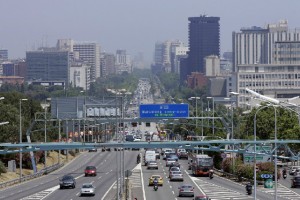UB School of Economics researchers confirm large inequalities in carbon mobility emissions in Barcelona
 A recent article published by the UB School of Economics researcher Germà Bel and PhD graduate Jordi Rosell in the scientific journal Energy Economics has confirmed the ineffective nature of toll policy design in the metropolitan area of Barcelona. The UB researchers adopted an innovative methodology in order assess the potential impact of several measures to reduce CO2 emissions. The authors found that conventional models encounter difficulties, while quantile analysis appeared to be a better tool for analyzing the behavior of groups of emitters.
A recent article published by the UB School of Economics researcher Germà Bel and PhD graduate Jordi Rosell in the scientific journal Energy Economics has confirmed the ineffective nature of toll policy design in the metropolitan area of Barcelona. The UB researchers adopted an innovative methodology in order assess the potential impact of several measures to reduce CO2 emissions. The authors found that conventional models encounter difficulties, while quantile analysis appeared to be a better tool for analyzing the behavior of groups of emitters.
Bel and Rosell found that the top 10% of emitters produce 49% of total emissions, implying a Gini index of 0.5 for the Metropolitan Area of Barcelona. “Compared with the income related Gini index for the same area, 0.3, mobility carbon emissions inequalities are larger than economic ones” Dr. Rosell said.
Most papers to date have studied CO2 emissions in terms of the average emitter, but this article does so for different population groups. The results show that the odds of a male being a high emitter are 112% higher than those of a female. The chances of finding a higher emitter among 30 to 44 years old individuals are also higher. The same applies for those individuals living outside the city of Barcelona. The probability of being a high emitter increases with the level of income as well as the level of education, even though those with secondary education are more likely to be high emitters than those with tertiary education.
The study suggests that increasing parking charges in the inner city and extending tolls to all motorways accessing the central area of Barcelona should reduce CO2 emissions associated with urban mobility. Net revenues from these cost-increasing policies could be devoted to improving public transportation supply to further reduce emissions, the authors suggest. “In Barcelona and other Mediterranean cities, extending the network or prohibiting are the main policies, while price demand policies, such as congestion charging or parking policies, are overlooked because they generate opposition before being implemented”, professor Bel said.
Dr. Bel and Dr. Rosell highlight that the type of analysis conducted here should be an effective tool for analyzing mobility behavior in different metropolitan areas. Data gathered from various cities would provide useful evidence for improving the design of urban mobility policies and analyze which are the socioeconomic factors that explain the level of carbon emissions from mobility.
Recent news
- Four researchers of the UB School of Economics are listed in the 2% of the world’s most influential scientists
- The second edition of the UB School of Economics Young Researchers Meeting highlighted the excellence of the research done in the field of Economics at the UB
- How the adoption of robots has influenced global sourcing activities among Spanish manufacturing firms
- A Closer Look at the MSc in Economics Class of 2025
- Call for expressions of interest for Assistant Professor positions
- A recent UB study analyzes the environmental and economic impact of flight ticket taxes in Europe
- Would you like to join us for a coffee with researchers from the Faculty?
- UB School of Economics is recruiting two tenure-elegible lecturers
- Call for expressions of interest: PhD Fellowships in Economics

Sorry, the comment form is closed at this time.